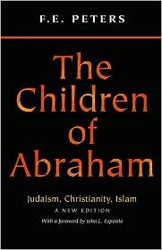Rosenberg, formerly an editor at the Jewish Publication Society and co-author (with Harold Bloom) of
The Book of J (
1990, Grove/Atlantic) has written a deconstruction of the patriarch’s life. The author suggests that Abraham was born into a highly sophisticated cultural and social setting. Basing his argument on cuneiform writings (which have been previously written about by Ephraim A. Speiser and Samuel N. Kramer) as well as biblical text, Rosenberg maintains that the Abraham story was recorded in King Solomon’s court, a thousand years after Abraham’s death. Biblical events such as the Creation story and the Flood are seen as a means by which a more humanized deity might communicate with a man he has chosen and who has chosen him.
The book translates parts of the text of Genesis, and breathes fresh insight into the story of the first Jew standing alone in a polytheistic culture — one which he challenged but by which he was nevertheless influenced. Rosenberg suggests that “the origin of civilization lies in exploring the boundary between religion and culture. Abraham’s journey, as we have followed it, spans this quest.”
Religion, like secular culture, shouldn’t exist in isolation. Abraham’s journey and quest brought the Creator down to earth and launched a human quest for the divine in the cosmos and within a secular (but tolerant and gracious) society.
The book has a chronology and an interesting chapter entitled “Essential Notes in the Margin,” a bibliographic essay, and a brief but stunning essay on how a translation should function and emerge from exposure to the text and its language.
This work will be appreciated by students of literature and liberal seminarians as well as by poets enamoured with divinity as it unfolds in human history.
Morton Merowitz holds degrees from Yeshiva University, the Dropsie College for Hebrew and Cognate Learning, and the State University of New York at Buffalo. He was involved in Jewish education for some ten years and currently reviews non-fiction literature which may be of interest and relevance to students and teachers of Jewish studies.


